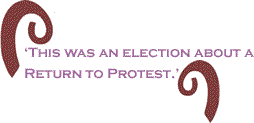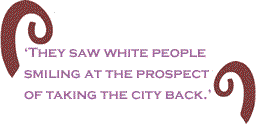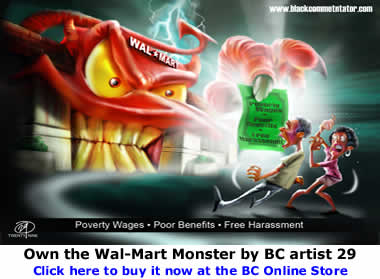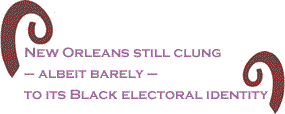
|
|||||||||||||||||||||
 |
|||||||||||||||||||||
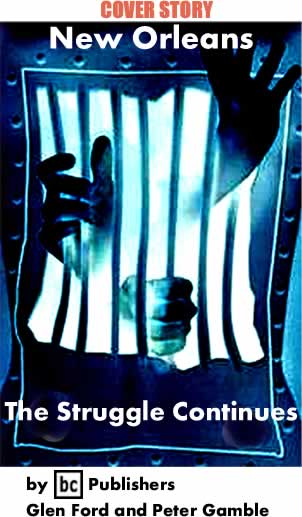 |
|
A New Orleans Black activist who prefers anonymity put it this way: “People say that you’re an Uncle Tom if you support Mitch [Landrieu] for mayor. Another brother answers, ‘but you’ve already got an Uncle Tom in office.’” By the logic of the anecdote, one-quarter of New Orleans Blacks could be viewed as having Tomish tendencies, while two-thirds want four more years of Uncle Tomism at city hall. Although the battle over who will become the next mayor of the devastated city cannot be encapsulated in a cute quip, one political fact emerged from last Saturday’s tortured election: neither of the two men that made it into the May 20 runoff are proper vessels for the aspirations of New Orleans’ 67 percent pre-Katrina Black majority. With more than half of New Orleanians still in exile, most of them African American, the results of the April 21 vote could only have been bizarre, a twisted exercise unworthy of a Third World country. Incumbent Ray Nagin, the Black Republican-turned-conveniently-Democrat who was the successful Great White Hope in 2002, garnering 85 percent of the white vote and only a minority of Black support, became the default African American candidate after nature and the Bush regime combined to empty New Orleans of most of its Black population. Whites discovered they no longer needed their Black surrogate, who quickly scrambled to establish racial credentials that he previously neither possessed nor wanted.
Lt. Gov. Mitch Landrieu, brother of Louisiana Democratic
Senator Mary Landrieu and son of the city's last white mayor,
Moon Landrieu (1970-1978), is considered “liberal” by white Politics of Protest “The vote had nothing to do with Ray Nagin,” said Mtangulizi Sanyika, spokesman for the African American Leadership Project (AALP). “When the media tried to define the election, the Black electorate turned the race into a protest. This was an election about a Return to Protest.”
Almost from the moment it became evident that a return to white rule was mathematically possible in a “new” New Orleans, local and national corporate media began using coded language to frame the anticipated election – terms like “historic opportunity for renewal.” African Americans understand racial code, too. Despite Ray Nagin’s abysmal and maddeningly confused Katrina performance, despite his previous role as the White Man’s Candidate and Mayor, majorities of African Americans believed it necessary to coalesce around a common point: Nagin’s bald head. Thus, his two-thirds share of the Black vote. “They saw Black people under attack,” said Sanyika. “They saw white people smiling at the prospect of taking the city back.” An April 1 march led by Rev. Jesse Jackson’s Rainbow/PUSH Coalition and the NAACP and co-chaired by Rev. Al Sharpton, further crystallized Black perceptions that “the effort to push the Black candidate [Nagin] out the door” was a threat to Blacks, according to Sanyika, who was among those who addressed the 3,000-strong rally. Election Day Surprise Right up to Election Day, it appeared to many that Blacks would be a minority of the electorate. Through official incompetence or design, no one could offer even a confident ballpark figure on the number of residents that remained in the city, or how many might return for the day to cast their ballots. One key factor was painfully evident: only a fraction of a (loosely) estimated 60 percent of residents living in exile had cast absentee or early ballots – about 21,000 voters. “The diaspora did not vote anything like their proportion,” Sanyika reported. Things did not look good.
Nevertheless, when the results were in African Americans comprised a slim majority of voters – 52 percent of 108,000 ballots cast. This, despite a white turnout of 44 percent versus 24 percent for Blacks. “The fact that as many Black folks popped up as they did on Election Day was a surprise to the White Power Structure,” said Sanyika. New Orleans still clung – albeit barely – to its Black electoral identity. The turnout shocked Black activists, too, because “we had no way of knowing” how many people were actually in the city. Historically, even
in a city as Black as pre-Katrina New Orleans, the consensus “Black”
candidate must get something approaching 90 percent African American
support to overcome the “white” consensus candidate. (Remember,
the Challenge to Activists The permanent government of developers and financiers, meanwhile, goes about its business of gentrification and Black removal with barely an acknowledgement of the electoral process – the reality in every American city regardless of the public promises of politicians.
The Nagin-appointed city reconstruction commission, effectively dominated by Republican businessman Joseph C. Canizaro, continues to refine its upscale and corporate dreams for New Orleans. As the April 25 New York Times reported:
City council-enacted legislation calls for equity in awarding contracts and jobs and for every neighborhood to be treated the same. However, as Sanyika points out, “it’s a very progressive piece of legislation…but it has to be implemented. We have to be part of the shaping of the city. We must impact the neighborhood planning process…the city legislative process.” The task is “rebuilding an entire city from the bottom up. You have to be part of the shaping of the city. You have to do everything simultaneously. There is no choice. You find yourself in the midst of an historic moment. We will not disappear.” Just as the masters of capital forge ahead with plans to shape urban America to their own ends, 365 days a year, so too must servants of the people, like the African American Leadership Project’s Sanyika and fellow strugglers. “The challenge for planners, organizers and activists is to rebuild the social movement on the ground. Even if Rev. Tom Watson, the most progressive candidate, had won, the challenge would still be the same.” BC Co-Publishers Glen Ford and Peter Gamble are writing a book to be title, Barack Obama and the Crisis in Black Leadership. |
|
| Home | |
Your comments are always welcome. Visit the Contact Us page to send e-Mail or Feedback or Click here to send e-Mail to [email protected] e-Mail re-print notice
If you send us an e-Mail message we may publish all or part of it, unless you tell us it is not for publication. You may also request that we withhold your name. Thank you very much for your readership. |
|
| April 27, 2006 Issue 181 |
||||||||||||||
|
||||||||||||||
|
||||||||||||||
| Printer Friendly Version of article | ||||||||||||||
 |
||||||||||||||
 |
||||||||||||||
| |
||||||||||||||
| |
||||||||||||||





















